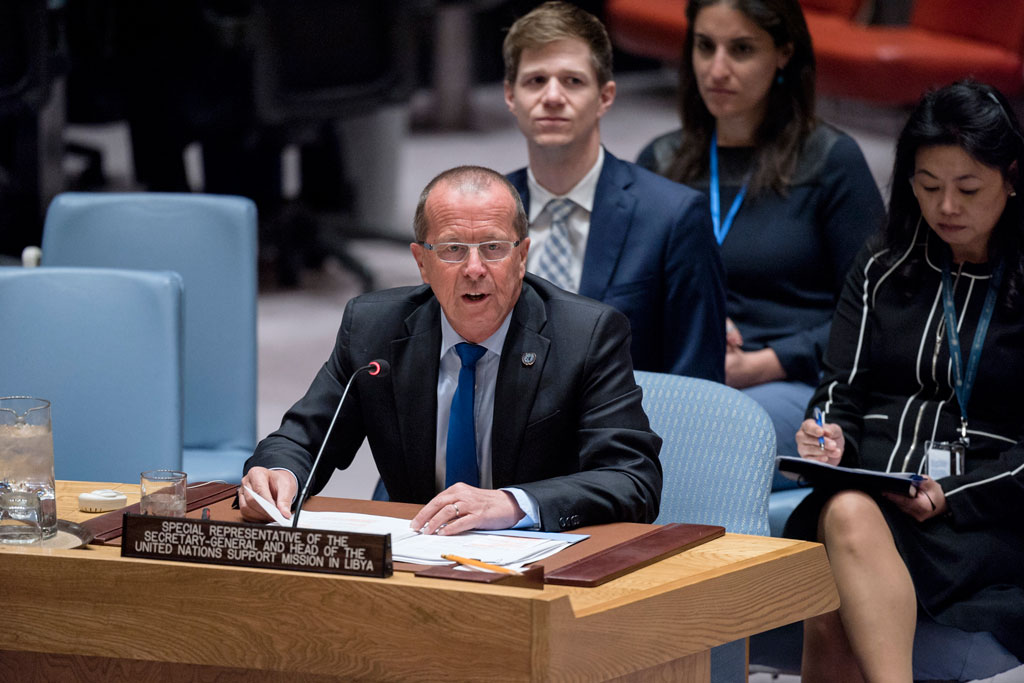New York – Widespread conflicts could return to Libya, yet the Libyan agreement could be amended to overcome the current political impasse, according to the United Nations Secretary-General Antonio Guterres.
An emerging consensus on the need for limited amendments to the agreement “represents an opportunity to overcome the current political stalemate and move the transition forward,” Guterres said.
In his report to the UN Security Council, Guterres warned that due to the volatile security situation in Tripoli and fighting in the eastern oil crescent and elsewhere, Libya risks a return to widespread conflict.
In the report released Thursday, the UN chief expressed alarm at the renewed military escalation and ongoing political stalemate in the country, which could increase pressure on the transitional process and the institutions that were established according to the Libyan political agreement.
Guterres said the UN-backed Presidency Council and government remain “constrained in their ability to govern effectively and to provide much needed basic services and security to the population.”
Meanwhile, members of the Security Council present during the statement of Martin Kobler, special representative of the United Nations for Libya, reiterated their support to all efforts aiming at achieving reconciliation and establishing a safe, united and democratic Libya, according to UN Italian Ambassador Sebastiano Cardi.
Kobler suggested the UN increases its support to the security, economy and political process in the country as means to put an end to the Libyan crisis.
The special representative warned in the UN Security Council Wednesday that the growing power of armed groups in Libya is curbing the aspirations for peace in that country.
Kobler told the Council that the optimism generated by the signing of the Skhirat Agreement has diminished. He emphasized that instead of the “sharp horizon” established by the Agreement he now sees instead “frustration, disappointment, sometimes anger, and often it is justified.”
Ambassador and permanent representative of UK to UN Matthew Rycroft said that ambassadors of UN permanent members said there is a difference between actions against terrorist threats and actions that could further deteriorate the situation in Libya.
Rycroft pointed out to the importance of acknowledging ISIS’ defeat in Sirte.
The Sec-Gen reminded all parties in his report that the Libyan crisis can’t be solved militarily, calling upon all to protect the civilians, natural resources and essential institutions in the country. He said the 2015 political agreement continues to be supported by the majority of Libyans and interested countries “as the only political framework to lead the country forward.”
In addition, Guterres reiterated the importance of establishing armed forces and active security forces that operate under civic control.
Guterres said that ISIS no longer controls territory in Libya, but its operatives have been sighted, it has been blamed for a number of attacks in different areas, and the international community in the country remains a target.
He said the 2015 political agreement continues to be supported by the majority of Libyans and interested countries “as the only political framework to lead the country forward.”
He said in the report that the potential for an escalating conflict remains due mainly to unaddressed political issues “and the multiplicity of armed actors on the ground with conflicting agendas.”
Guterres urged all parties in Libya to address the key issues blocking implementation of the agreement including the composition of various institutions, especially the executive authority and military command.
The secretary-general said he remains “deeply alarmed” by the human rights situation in the country where violations of international law continue to be perpetrated by all parties to the conflict.
“Armed groups from all sides continued to abduct, torture, and kill civilians,” he said. “In addition, ordinary crime was endemic, mainly owing to the state of general lawlessness and the weakness of judicial institutions.”
He said in the report that the potential for an escalating conflict remains due mainly to unaddressed political issues “and the multiplicity of armed actors on the ground with conflicting agendas.”
Guterres, however, said that the parliament is still divided and haven’t reached the legal quorum to vote on the amendment suggested through which institutions of the Libyan political agreement would be merged. The parliament didn’t also agree on the formation of the envoy which will represent it during talks with certain parties.
Yet, the report mentioned that the temporary government in al-Baydaa continued to confirm its authority in east Libya despite not being legal within the framework of the political agreement.
The former government, National Salvation government, is not internationally recognized and took over several non-occupied government buildings.
